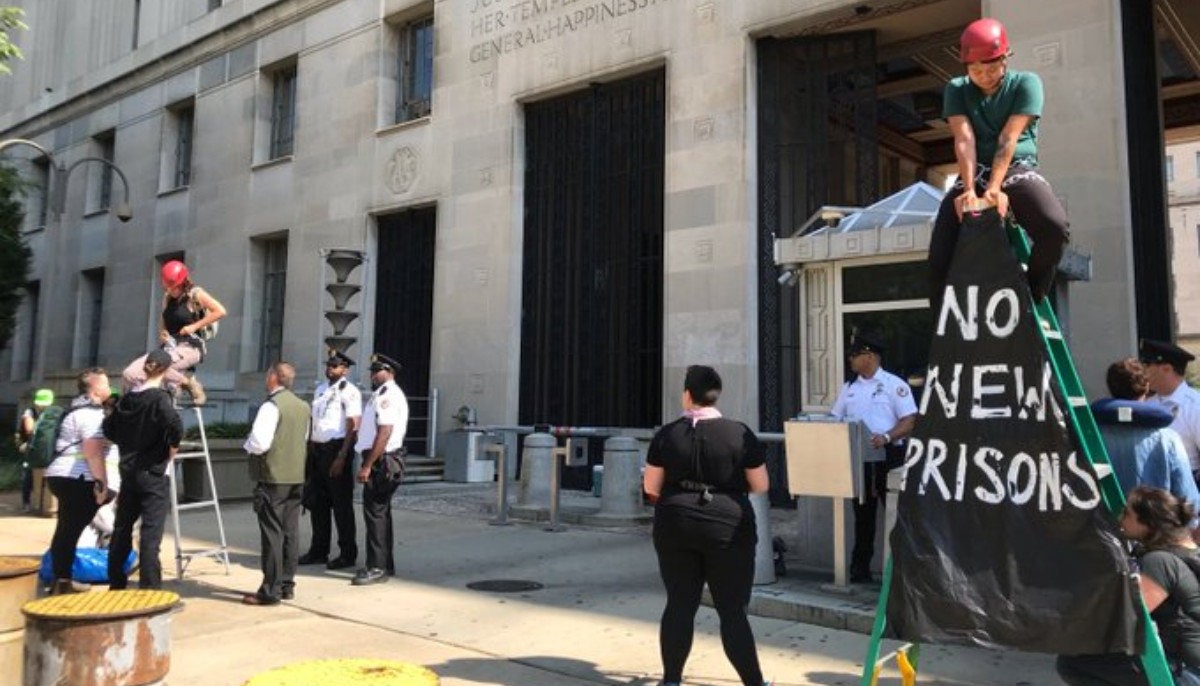Filed under: Action, Incarceration, Southeast

Report from abolitionists in Washington DC about a blockade of the entrance to the DOJ in response to continued abuses in Alabama prisons.
This morning organizers with DC Abolition Coalition demonstrated at the U.S. Department of Justice in solidarity with the demands of incarcerated freedom fighters in Alabama prison facilities to bring attention to rampant abuses within the Alabama Department of Corrections.
?Listen?to hear from an Alabama comrade from the inside. pic.twitter.com/EKJMusTzaH
— FightToxicPrisons (@FightXPrisons) October 1, 2019
Protesters scaled and locked themselves on top of ladders blocking the entrances of the U.S. Department of Justice. Today’s demonstration is an escalation of actions taking place across the country to stand in support with demands presented by Alabama-based prisoner advocacy group Unheard Voices of the Concrete Jungle.
These demands include that the DOJ must:
1. Follow through on filing suit against the ADOC, implement staffing replacements and mass releases.
2. Stop the construction of all new prison and jail facilities.
3. An end to targeted retaliation against incarcerated organizers, including the abusive use of solitary confinement and non-lateral transfers.
4. Provide real rehabilitative programming and shortened sentences for ‘good behavior’.
5. Remove U.S. Attorney for the Northern District of Alabama Jay Town from office.
6. Halt the transition from in-person to video-only visitation.
The federal Department of Justice came out with a scathing report in April, 2019 which outlined the ADOC’s routine violations of the Eighth Amendment of the US Constitution, which protects incarcerated people from cruel and unusual punishment. As the report found these violations have created an environment in Alabama prisons in which prisoners are routinely subjected to a lack of mental and medical healthcare, overcrowding, sexual abuse, and in many cases death from “a high level of violence that is too common, cruel, of an unusual nature, and pervasive.” The ADOC had up to 7 weeks to remediate the problem before a lawsuit could be filed. After nearly 7 months, conditions have only worsened inside Alabama prisons, while Governor Kay Ivey and U.S.Attorney Jay Town move forward on plans to build three new men’s prisons in Alabama.
HAPPENING NOW:
This morning organizers with the DC Abolition Coalition, the Campaign to Fight Toxic Prisons, and more locked down to ladders in front of the entrance of the U.S. Department of Justice. pic.twitter.com/RX7XwyorRM
— FightToxicPrisons (@FightXPrisons) October 1, 2019
“Freedom fighters on the inside have been putting their bodies on the line to demand justice but their voices go unheard, so we’re here today to force the DOJ to listen to and act on these very basic demands,” said Mei Azaad, of activist group Fight Toxic Prisons.
Meanwhile, the DOJ continues to ignore the overcrowding, understaffing and chronic violence, even as Alabama family members and supporters of incarcerated people have held protests and outreach efforts on several occasions in the past months, both in Alabama and DC.
“Prisons don’t keep anyone safe,” remarked another member of the coalition, Fariha Huriya with #Vaughn17 Support, “As part of the Vaughn 17 family, we salute all prison liberators.”
Protestors on 10th entrance still holding it down #stopmassincarceration #endprisonslavery #nonewjails pic.twitter.com/o0oBPf9b5p
— fariha ︻╦╤─intifada (@LeylaKahled) October 1, 2019
The coalition which has identified and campaigned against injustice within local facilities presented the following demands to address D.C.’s high level of incarceration:
1. End all collaboration between the DC Jail and ICE (Immigration and Customs Enforcement).
2. Pass the Second Look Amendment.
3. Restore local control of DC parole.
4. Halt the proposal to construct new jail facilities in D.C.
Campaigners with DC Abolition Coalition will continue to ramp up pressure against the the Department of Justice and Alabama Department of Corrections until the demands for justice are met and the voices of those subjected to the violent conditions in the ADOC are finally heard.





